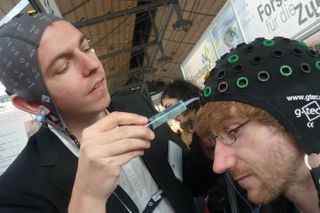Scientists use mind power to control computers
Breakthrough research at the Washington University School of Medicine could mean amazing things for those with disabilities or illnesses.

Researchers at the Washington University School of Medicine have created a technical implant enabling users to control computer functions simply by thinking of certain sounds.
Historically, these brain/computer interface implants have been linked to the part of the brain that controls muscle movement. This approach differs as it tries to mimic the process used when humans speak.
"There are many directions we could take this, including development of technology to restore communication for patients who have lost speech due to brain injury or damage to their vocal cords or airway," said Eric C. Leuthardt MD, assistant professor of neurosurgery, biomedical engineering and neurobiology at Washington University's School of Medicine in St. Louis.
"That makes sense when you're trying to use these devices to restore lost mobility - the user can potentially engage the implant to move a robotic arm through the same brain areas he or she once used to move an arm disabled by injury. But that has the potential to be inefficient for restoration of a loss of communication."
Researchers at the medical school are currently studying the implant at work in patients suffering from epilepsy. The temporary implants are used to replace areas of the brain that cause seizures and are resistant to medication.
Leuthardt and his team have focused on four sounds during their research, which is published in the The Journal of Neural Engineering. These sounds are:
oo, as in few
Get the ITPro. daily newsletter
Receive our latest news, industry updates, featured resources and more. Sign up today to receive our FREE report on AI cyber crime & security - newly updated for 2024.
e, as in see
a, as in say
a, as in hat
The computer interface has been programmed to recognise and respond when patients think of these sounds, allowing them to control a cursor simply by using their mind.
"We can distinguish both spoken sounds and the patient imagining saying a sound, so that means we are truly starting to read the language of thought," Leuthardt said.
"This is one of the earliest examples, to a very, very small extent, of what is called reading minds' detecting what people are saying to themselves in their internal dialogue."
It is hoped in the future these types of implants could be used as a permanent remedy for such cases, as well as evolving the interface to respond to other brain actions and commands.
"We want to see if we can not just detect when you're saying dog, tree, tool or some other word, but also learn what the pure idea of that looks like in your mind," Leuthardt added.
"It's exciting and a little scary to think of reading minds, but it has incredible potential for people who can't communicate or are suffering from other disabilities."
Austrian tech firm Gtec unveiled its own take on mind-reading technology at the 2010 CeBIT trade show in Germany.

Stuart Turton, a contributor to IT PRO's sister title PC Pro tried out the tech.
Maggie has been a journalist since 1999, starting her career as an editorial assistant on then-weekly magazine Computing, before working her way up to senior reporter level. In 2006, just weeks before ITPro was launched, Maggie joined Dennis Publishing as a reporter. Having worked her way up to editor of ITPro, she was appointed group editor of CloudPro and ITPro in April 2012. She became the editorial director and took responsibility for ChannelPro, in 2016.
Her areas of particular interest, aside from cloud, include management and C-level issues, the business value of technology, green and environmental issues and careers to name but a few.





